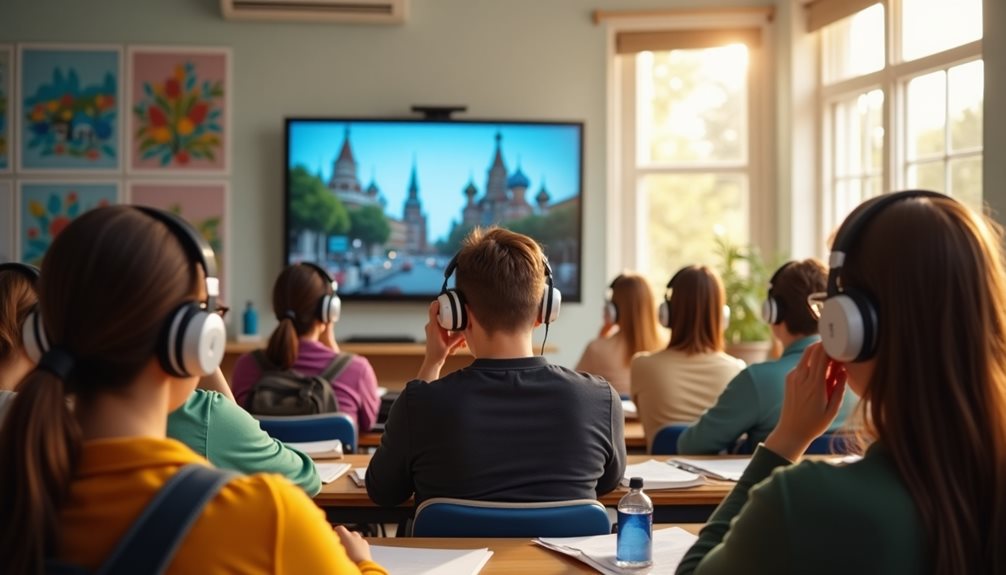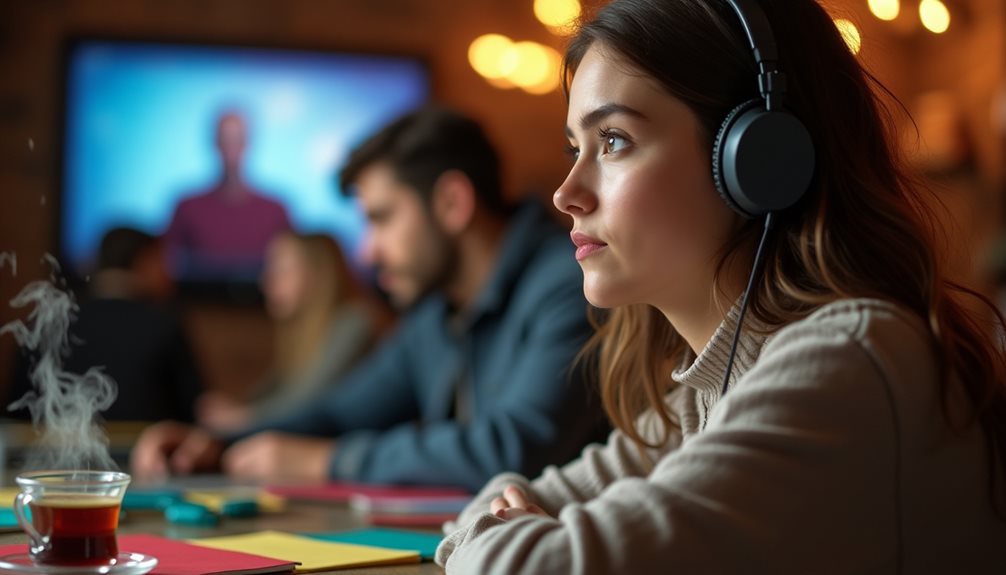Developing listening skills in Russian is essential for effective language acquisition. Engaging with various audio and video resources allows learners to experience authentic language use and cultural nuances. By incorporating podcasts, movies, and music into their study routines, students can enhance comprehension and improve pronunciation. However, the challenge lies in selecting the right materials that resonate personally. This prompts an inquiry: what strategies can one employ to create an effective and enjoyable listening practice?
Table of Contents
ToggleThe Importance of Listening Skills in Language Learning

Listening skills are often underestimated in language learning, yet they hold a key position in the journey toward Russian fluency. Exposure to authentic spoken Russian—whether through conversations, films, podcasts, or songs—provides learners with invaluable input that goes far beyond textbooks. This kind of listening experience not only trains the ear to recognize fast, colloquial speech but also introduces learners to slang, idiomatic expressions, and cultural references that are rarely found in written materials.
One important aspect of developing listening skills is the process of bottom-up and top-down listening. Bottom-up listening involves decoding sounds, words, and grammatical structures, while top-down listening relies on context, prediction, and prior knowledge to make sense of what is heard. Successful Russian learners combine both strategies: they pay attention to details such as case endings or verb conjugations, while also using context to fill in gaps and infer meaning. This dual approach enhances comprehension and reduces the frustration that often comes from missing individual words.
Another factor is the role of repetition and varied input. Repeated exposure to common phrases and sentence patterns helps internalize them, making it easier to recognize them in new contexts. Meanwhile, listening to different speakers—men and women, old and young, from various regions—broadens one’s familiarity with accents, dialects, and speech rates. This diversity is crucial in Russian, where pronunciation and vocabulary can vary significantly across Russia and other Russian-speaking countries.
Active listening activities, such as transcribing short audio clips or shadowing (repeating aloud immediately after hearing), further accelerate progress. Such exercises sharpen attention to detail and improve pronunciation, rhythm, and intonation. Research has shown that learners who regularly engage in these activities tend to develop better speaking skills as well, since listening and speaking are closely linked.
Furthermore, strong listening skills foster a sense of independence. Learners become more confident in navigating real-life situations—whether asking for directions in Moscow, understanding a news report, or enjoying a Russian film without subtitles. This confidence not only boosts motivation but also makes the learning process more enjoyable and sustainable over time. In sum, prioritizing listening lays a solid foundation for all other language skills and brings learners much closer to genuine communication in Russian.
Exploring Podcasts for Russian Language Immersion
Podcasts serve as an effective resource for language learners aiming to strengthen their listening skills. By offering access to natural speech patterns and conversational rhythms, they allow listeners to attune their ears to the pace and flow of native dialogue. Regular exposure to spoken language through podcasts helps learners become familiar with various accents, regional differences, and informal speech, which are often absent from traditional textbooks.
Listening to a wide range of topics—such as news, interviews, storytelling, or discussions on daily life—enables learners to encounter vocabulary and expressions in authentic contexts. This exposure not only broadens their lexical knowledge but also deepens their understanding of cultural references and social norms embedded within the language.
To maximize the benefits of podcast listening, it is helpful for learners to set specific goals, such as focusing on comprehension or noting new words and phrases. Replaying challenging segments, summarizing content, or even shadowing speakers can transform passive listening into an active skill-building exercise. Consistent engagement with these audio materials can significantly improve both comprehension and pronunciation, providing a strong foundation for overall language proficiency.
Utilizing Movies to Enhance Comprehension
Watching movies in the target language is an effective method for improving comprehension skills. Films expose learners to authentic dialogue, varied speech registers, and everyday expressions that are essential for real-world communication. The combination of spoken language and visual storytelling helps reinforce meaning, making it easier to understand context and pick up on subtle cues such as body language and tone.
Selecting films that match one’s interests increases motivation to engage with the material, while exploring different genres introduces a range of vocabulary and linguistic styles. For instance, informal conversations in comedies can highlight casual speech and slang, whereas historical or dramatic films may offer more formal or specialized language.
By actively watching, learners can pause and rewatch scenes to focus on specific phrases or expressions. Noting unfamiliar words and observing how they are used in context supports vocabulary acquisition. Additionally, paying attention to cultural references and social interactions portrayed in movies can deepen understanding of the customs and values associated with the language.
Incorporating films into a regular study routine provides a dynamic and enjoyable way to practice listening skills. Ultimately, this exposure not only strengthens comprehension but also builds confidence in interpreting and responding to natural, native-level speech.
![]()
The Role of Music in Developing Listening Abilities
Music plays a valuable role in the development of listening skills for language learners. Songs present language in a memorable and rhythmic format, making it easier to internalize pronunciation, intonation, and natural speech patterns. The repetition found in many lyrics reinforces vocabulary and common phrases, while exposure to different musical styles introduces learners to a wide array of linguistic features and cultural themes.
Analyzing lyrics offers a practical way to improve comprehension, as it encourages attention to detail and understanding of how words are used in context. Discussing the meaning behind songs or examining the stories they tell can deepen both linguistic and cultural awareness. Additionally, focusing on the relationship between the melody and the words helps train the ear to distinguish sounds, tones, and stress patterns, which are crucial for accurate listening.
Exploring various genres and eras of music provides insight into how language evolves over time and reflects societal trends. Supplementing musical study with related content, such as interviews or behind-the-scenes discussions, further enhances listening practice by exposing learners to different speaking styles and informal language.
Integrating music into language learning routines not only makes the process enjoyable but also supports active engagement with authentic material. This approach strengthens auditory skills and fosters a more intuitive connection to the language.
Incorporating YouTube Channels for Practical Exposure
Online video channels provide a contemporary and easily accessible means for learners to improve their listening skills in the target language. With a wide range of content available, from themed playlists to everyday conversations, learners can experience authentic language use in a variety of contexts. This exposure supports the development of both general comprehension and the ability to understand specific topics relevant to Russian culture.
Interactive videos often feature native speakers, allowing viewers to hear natural pronunciation, intonation, and conversational flow. The visual component of video content further aids comprehension by offering context clues through gestures, facial expressions, and situational cues. This multi-sensory approach helps reinforce language learning, making it easier to follow and retain new information.
Many channels also cultivate active communities where learners can exchange ideas, ask questions, and offer support. This sense of collaboration motivates learners to consistently engage with the material and participate in discussions, which can lead to deeper understanding and improved listening skills.
Incorporating these online resources into regular study routines creates opportunities for immersive practice. Engaging with a variety of video content not only strengthens listening ability but also fosters a more nuanced appreciation for the language and its cultural context.
Engaging With Audiobooks for Pronunciation Practice

Listening to audiobooks provides an effective method for improving pronunciation skills in Russian. Audiobooks expose learners to clear and natural speech, allowing them to hear correct pronunciation, intonation, and rhythm as used by skilled narrators. Carefully choosing materials with well-articulated speech helps learners focus on the finer details of sound and accent.
By repeatedly listening to passages, learners can internalize the flow and stress patterns of the language. This practice not only supports accurate pronunciation but also helps with understanding how words are connected in natural speech. Mimicking the narrator—repeating sentences or phrases aloud—reinforces correct intonation and articulation, making it easier to sound natural when speaking.
In addition to pronunciation, audiobooks aid vocabulary acquisition. Hearing new words in context makes them more memorable and helps learners understand their usage. Employing active listening techniques, such as pausing to repeat or summarize content, further strengthens comprehension and retention.
Regular engagement with audiobooks transforms listening into an interactive exercise, building both confidence and fluency. This approach allows learners to refine their speaking skills while enjoying authentic language content, making pronunciation practice both accessible and effective.
Understanding Different Dialects and Accents
Listening to a variety of dialects and accents is an important part of developing strong language skills. Russian, like many languages, is spoken differently across regions, with variations in pronunciation, vocabulary, and informal expressions. Exposure to these differences helps learners build a more flexible understanding of the language and prepares them to communicate effectively in a range of situations.
Engaging with materials that feature regional speech patterns allows learners to recognize subtle distinctions and adapt their listening strategies accordingly. This practice not only improves overall comprehension but also provides insight into the cultural and social factors that shape language use in different areas.
By seeking out diverse audio and video sources, learners become more attuned to the ways Russian is spoken beyond the standard form. This broader exposure strengthens listening skills, boosts confidence in real-life interactions, and deepens appreciation for the linguistic diversity within Russian-speaking communities.
Setting Realistic Listening Goals and Tracking Progress
Approaching listening skills with clear and achievable goals is a practical way to overcome the challenges of language learning. By first assessing their current abilities, learners can set specific targets that are both meaningful and attainable, such as recognizing familiar words in conversations or understanding the main ideas in short audio segments.
Breaking down the learning process into manageable steps helps maintain motivation and provides a clear sense of direction. Celebrating progress—no matter how small—reinforces positive habits and builds confidence. Regular self-assessment, along with feedback from peers or instructors, allows learners to track improvements, identify areas for further development, and refine their study strategies as needed.
This ongoing cycle of goal setting and progress review transforms the learning process into a series of achievable milestones. It helps learners stay focused and engaged, making the path to greater listening comprehension feel more manageable and rewarding. This structured approach supports steady improvement and fosters a lasting commitment to mastering listening skills in Russian.
Creating a Personalized Listening Routine
Establishing a personalized listening routine is a practical approach to improving language comprehension. Tailoring this routine to individual interests and learning styles helps sustain motivation and makes the process more enjoyable. By selecting topics and materials that capture their attention, learners are more likely to engage deeply with the content and maintain consistent practice.
Including a mix of audio and video sources—such as conversations, music, and movies—ensures a broad range of listening experiences. This variety exposes learners to different accents, vocabulary, and levels of formality, which supports the development of well-rounded listening skills. Adjusting the routine to fit daily life, for example by listening during commutes or while doing household tasks, helps build regular practice into existing schedules without adding extra pressure.
Tracking progress and periodically revisiting goals can help learners identify areas for improvement and adjust their routines as needed. Reflecting on what types of materials are most effective or enjoyable allows for ongoing refinement, making the listening experience both productive and rewarding.
By integrating listening practice into everyday activities in a thoughtful, personalized way, learners can steadily enhance their comprehension and develop a stronger connection to the language. This approach turns language learning into a natural part of daily life, supporting long-term success.
![]()
Russian Listening Skills Quiz: Test Your Strategies for Effective Practice
Question 1
Which of the following is NOT mentioned as a benefit of using movies for developing Russian listening skills?
a) Exposure to authentic dialogue and varied speech registers
b) Reinforcement of meaning through visual storytelling
c) Immediate fluency in speaking Russian
Correct answer:
c) Immediate fluency in speaking Russian
Question 2
What is one recommended strategy for making listening practice more effective and engaging according to the article?
a) Focusing only on textbook dialogues
b) Choosing materials that match personal interests
c) Ignoring unfamiliar words while listening
Correct answer:
b) Choosing materials that match personal interests
Question 3
Why is exposure to different Russian dialects and accents important for learners?
a) It helps learners memorize grammar rules more quickly
b) It prepares learners to communicate in a range of real-life situations
c) It allows learners to avoid learning standard Russian
Correct answer:
b) It prepares learners to communicate in a range of real-life situations
Frequently Asked Questions
What Are Effective Ways to Improve Listening Skills Outside of Structured Lessons?
To enhance listening skills outside structured lessons, individuals can explore engaging podcasts and participate in immersive experiences. These methods foster practical understanding and retention, enriching the learning journey while allowing for personal exploration and growth.
How Can I Stay Motivated While Practicing Russian Listening Skills?
To maintain motivation while practicing listening skills, individuals should focus on goal setting and progress tracking. Establishing clear objectives and regularly reviewing advancements fosters a sense of achievement, encouraging continued engagement and personal growth in language learning.
Are There Specific Genres of Music Better for Language Learning?
Certain music genres, such as folk and pop, often feature relatable lyrical content, making them particularly effective for language learning. Engaging with these styles can enhance vocabulary retention and improve listening comprehension through enjoyable, immersive experiences.
What Should I Do if I Struggle to Understand Native Speakers?
When struggling to understand native speakers, one should employ effective listening strategies and comprehension techniques. Practicing active listening, utilizing context clues, and repeating phrases can enhance overall understanding and foster greater confidence in engaging conversations.



